

Neil deGrasse Tyson on linguists and Arrival. This is a guest post submitted by Nathan Sanders and colleagues.
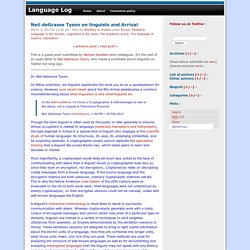
It's the text of an open letter to Neil deGrasse Tyson, who made a comment about linguists on Twitter not long ago. Dr. Neil deGrasse Tyson, As fellow scientists, we linguists appreciate the work you do as a spokesperson for science. However, your recent tweet about the film Arrival perpetuates a common misunderstanding about what linguistics is and what linguists do:
Totally Word Mapper. « previous post | next post » Jack Grieve Twitter-based Word Mapper (see "Geolexicography", 1/27/2016) is now available as a web app — like totally: Or in terms of local frequency:
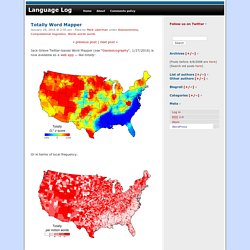
Folktale phylogeny. « previous post | next post » Over at Languagehat's place, there's been a lively discussion of Sara Graça da Silva & Jamshid J.
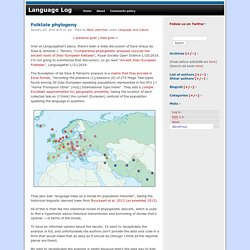
Tehrani, "Comparative phylogenetic analyses uncover the ancient roots of Indo-European folktales", Royal Society Open Science 1/20/2016. I'm not going to summarize that discussion, so go read "Ancient Indo-European Folktales", Languagehat 1/21/2016. The concept of "mother" in linguistics. « previous post | next post » I began drafting this post around Mother's Day, which we recently observed, but got distracted by other things.
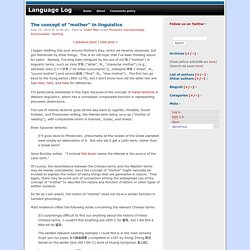
This is an old topic that I've been thinking about for years. Namely, I've long been intrigued by the use of mǔ 母 ("mother") in linguistic terms, such as zìmǔ 字母 ("letter", lit., "character mother") (e.g., sānshíliù zìmǔ 三十六字母 ["36 initial consonants"]), shēngmǔ 声母 ("initial", lit., "sound mother") and yùnmǔ 韵母 ("final", lit., "rime mother"). The concept of "mother" in linguistics. Vanessa Ruiz. « previous post | next post » Fernanda Santos and Christine Hauser, "Arizona News Anchor Is Drawn Into Debate on Her Accent and the Use of Spanish", NYT 9/3/2015: An Arizona news anchor defended her pronunciation of Spanish words during English broadcasts, saying she delivers them the way the language is intended to be spoken. […]

Participles, conveying urgency? « previous post | next post » The first two and last two panels of today's Doonesbury: The idea that short phrases convey urgency is a well-established principle of writing advice, e.g. here and here.

But it's not obvious to me that either in headlines or in broadcast news, the use of present participles rather than tensed verbs is generally the more urgent-seeming choice: The town reels, its dreams of a better tomorrow up in smoke! The town reeling, its dreams of a better tomorrow up in smoke! Typical options like “heâ€� and “sheâ€� « previous post | next post » Collin Binkley, "He?
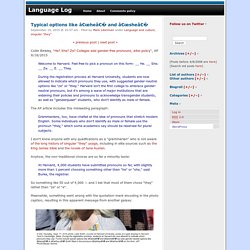
She? You use the present tense, you persuade people to save money. « previous post | next post » We've had some discussion lately about the sports subjunctive/baseball conditional/bare paratactic conditional.
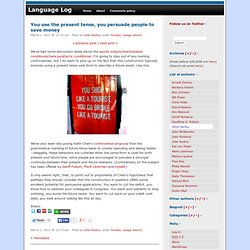
I'm going to stay out of any naming controversies, but I do want to pick up on the fact that this construction typically involves using a present tense verb form to describe a future event. Like this: The QWERTY effect. « previous post | next post » Rebecca Rosen, "The QWERTY Effect: The Keyboards Are Changing Our Language!
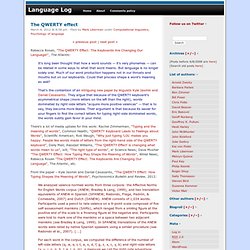
", The Atlantic: It's long been thought that how a word sounds — it's very phonemes — can be related in some ways to what that word means. But language is no longer solely oral. Much of our word production happens not in our throats and mouths but on our keyboards. A non-mathematical theory of communication. « previous post | next post » According to Claude Shannon, "A Mathematical Theory of Communication", Bell System Technical Journal 1948: The fundamental problem of communication is that of reproducing at one point either exactly or approximately a message selected at another point.
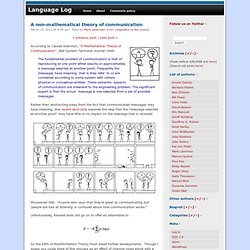
QWERTY: Failure to replicate. « previous post | next post » Following up on "The QWERTY effect", 3/8/2012, I got this email earlier today from Peter Dodds: I just saw your piece on these curious QWERTY findings re positivity. I see you used the ANEW data set, and this has prompted me to point to our much larger data set (just over 10,000 words) that we have for positivity/happiness (I've been meaning to write for a while). Sweden’s gender-neutral 3rd-person singular pronoun. « previous post | next post » Slate has an article lambasting Sweden's growing enthusiasm for total gender neutrality, and it raises the profile of a move, actually originating in the mid 1960s, to get hen established as a new pronoun meaning "he/she/it", eliminating the forced choice between han "he" and hon "she". I don't know which I would say is likely to be more difficult: eliminating gender stereotypes and inequalities from society or getting a neologism established by fiat in the set of pronouns in a language.
And I don't know Sweden (never been there) and I don't know Swedish (never studied it). Apart from that, I don't have anything interesting to say on this potentially very interesting linguistic topic in the news. Big Data in the humanities and social sciences. « previous post | next post » I'm in Berkeley for the DataEDGE Conference, where I'm due to participate in a "living room chat" advertised as follows: Size Matters: Big Data, New Vistas in the Humanities and Social SciencesMark Liberman, Geoffrey Nunberg, Matthew SalganikVast archives of digital text, speech, and video, along with new analysis technology and inexpensive computation, are the modern equivalent of the 17th-century invention of the telescope and microscope.
We can now observe social and linguistic patterns in space, time, and cultural context, on a scale many orders of magnitude greater than in the recent past, and in much greater detail than before. The place and time of Proto-Indo-European: Another round. « previous post | next post » A note yesterday from Russell Gray: Hi Mark, we have a paper out in Science today. I've attached a copy plus a link to a website where we give a more accessible account of the paper. I expect this will be rather controversial again but we have been very thorough both with improving the quality of the data and with testing the robustness of our geographic inferences.
Universal alphabet. « previous post | next post » Not that I think this is any sort of panacea, but our good friends at BBC have seen fit to ask: "Could a new phonetic alphabet promote world peace? " Although backers of this supposed universal alphabet claim that "it will make pronunciation easy and foster international understanding", I have doubts that SaypU (Spell As You Pronounce Universal project) constitutes a viable route to world peace. It is curious that SaypU, which uses 24 letters, dispenses with precisely those three letters that give persons who are unfamiliar with Pinyin (official PRC Romanization for Mandarin) the most trouble: "c", "q", and "x". It also adds a reverse "e" for schwa, but, since standard keyboards do not have this symbol, the asterisk (*) may be used to represent it. The home page of the SaypU project has a conversion tool that you can use to render various traditional spellings into SaypU.
How the first letter was written. Scandinavian influence on English syntax. Mandarin by the numbers. Elmore Leonard, 1925-2013. Computational linguistics and literary scholarship. "I feel like" QWERTY again. Now it's cows that use names (sigh) The unpredictability of Chinese character formation and pronunciation. Keith Chen, Whorfian economist. Reverse English. Alyssa “talks backwards” Proto-Indo-European in Prometheus? Thought experiments on language and thought.